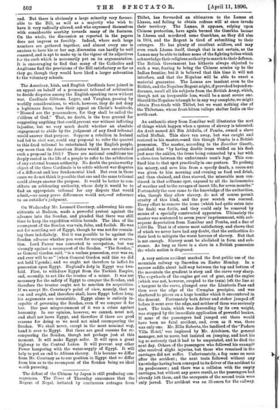The American, Irish, and English Cardinals have joined in an
appeal on behalf of a permanent tribunal of arbitration to decide disputes among the English-speaking races without war. Cardinals Gibbons, Logue, and Vaughan, passing by worldly considerations, to which, however, they do not deny a legitimate force, base their appeal on Christ's beatitude, "Blessed are the peacemakers, for they shall be called the z'aildren of God." That, no doubt, is the true ground for suggesting anything that could prevent war without inflicting injustice, but we very much doubt whether an absolute engagement to abide by the judgment of any fixed tribunal would answer that purpose. Suppose a rebellion in Ireland had led to civil war, could any proposal to refer the quarrel to this fixed tribunal be entertained by the English people, any more than the American States would have entertained such a proposal in 1861 ? There are national conditions too deeply rooted in the life of a people to refer to the arbitration of any external human authority. No doubt the praiseworthy object of the three Cardinals is to settle without war disputes of a different and less fundamental kind. But even in those cases we do not think it possible that one and the same tribunal could always answer the purpose. It would be better to con- stitute an arbitrating authority, whose duty it would be to find an appropriate tribunal for any dispute that would admit, —as many grave differences would not,—of reference to an outsider's judgment.


































 Previous page
Previous page